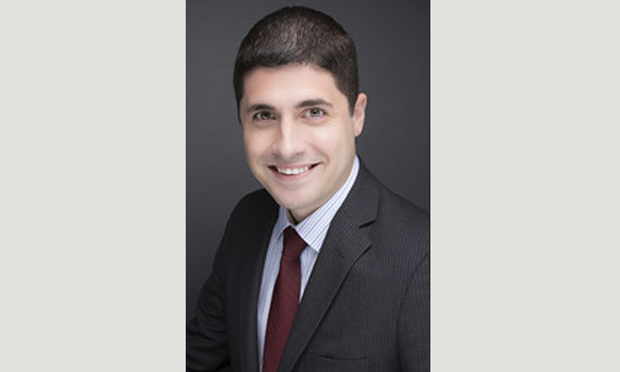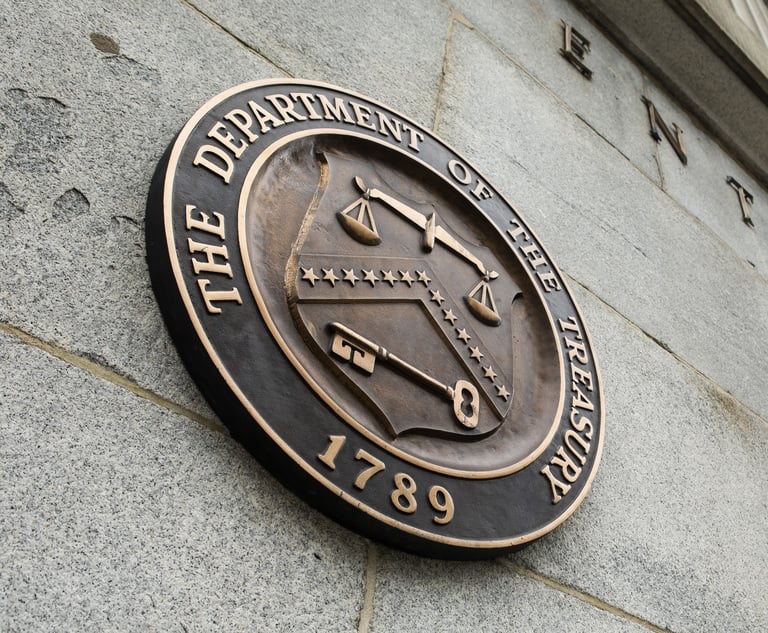The Legal Industry After Covid-19: What Has Changed and What May Change?
In light of the crisis the United States, and the world, face with COVID-19, those changes are now not simply increasing but may change the way many in the legal industry function permanently.
May 19, 2020 at 11:36 AM
5 minute read
 Henny Shomar of Tripp Scott.
Henny Shomar of Tripp Scott.Entering 2020, with technology expanding at an increasingly rapid pace, changes to the way attorneys and others in the legal field do business were already occurring. In light of the crisis the United States, and the world, face with COVID-19, those changes are now not simply increasing but may change the way many in the legal industry function permanently.
The topic of legal assistance provided through the internet has been transformative and controversial well before the current state of affairs. As an example, documents in Florida can now be notarized online after meeting certain requirements effective Jan. 1. This is part of a larger push for online access to legal assistance and the ability to use tools provided by technology in the justice system. One of the concerns that has been debated for years was the risk of fraud and the argument that it is less reliable than in person confirmation.
However, with the growing pandemic of COVID-19, the Florida Supreme Court commenced undertaking extraordinary emergency action, changing how courts function in a matter of weeks transforming the legal industry to allow for its continuity during the pandemic. Courts initially appeared cautious to move cases forward, calling on non-emergency related matters to be stayed or not scheduled for hearings. However, as days turned into weeks and weeks turned into the prospect of months, this hesitation changed.
Video Conference: The Florida Supreme Court issued AOSC20-13, which suspended rules, orders,and opinions on limitations as to communication equipment for proceedings and direction to chief judges of circuit courts to establish temporary procedures through such equipment to allow matters to continue. Circuit courts rolled out video conferencing procedures to allow for hearings to proceed forward avoiding the creation of a backlog. At first, it appeared many were hesitant proceeding with matters not considered "essential," continuing cases to reconvene after the crisis passes. However, as practitioners, courts and the world learned that COVID-19 may last longer than a few weeks, courts began setting matters via video conference even if it was a complicated evidentiary matter or a trial. This has forced the judicial system to move forward, and as a result limit the prejudice to clients who have been waiting to have their day in Court.
Administering Oath Remotely: Prior to COVID-19, the ability for a witness not present in the courtroom to be placed under oath was substantially limited absent a notary being physically present with the witness. However, the Florida Supreme Court issued AOSC20-16. This order suspended any restrictions to administering an oath through audio or video conferencing. This order allowed courts take sworn testimony in hearings that were occurring throughout the state. Concerns on the issue notwithstanding, courts in Florida now have been hearing evidentiary matters and trials throughout the pandemic, taking testimony and disposing of issues. The order is temporary and will no longer be effective once restrictions are lifted, however the ultimate result of this tool allowing cases to move forward during this time is assisting thousands of practitioners in their matters.
I have for myself experienced first-hand the change within the last several weeks, where at first attorneys and courts were hesitant to discuss scheduling matters to proceed, now has conducted numerous hearings via zoom videoconference, including a trial. While the technology is not perfect and there is an argument to make for live in-person examination in a courtroom, what is clear is the technology can be used to further the administration of justice.
No one can truly predict what the future holds once our communities return to normal and we defeat COVID-19. These transformations of the legal industry may be temporary, but their impact may very well be permanent. Law firms will surely consider the viability of remote operations for their future plans, including how much square footage is needed for their next lease, and investment in technology and remote access. Courts will consider whether providing video conferencing (which the court system now has) in the future will provide another tool in their effort to keep up with high case loads.
Will the lessons and experiences of the past few months push for changes to the administration of justice through technology? Will administering oaths through audio-video communication become permanent? Will courts that have not gone fully electronic and paperless now do so? Will law firms, and other businesses, shrink their footprint by reducing commercial square footage after considering whether working remotely had any positive impacts on their bottom line? Only time will tell. What is certain though is the amazing power technology provided to businesses worldwide to continue to provide services, and keep people employed, during this unprecedented crisis of our lifetime. And when we beat it, and the dust settles, the discussion on how it changes our world will include this topic.
Henny L. Shomar is a director at Tripp Scott practicing in the areas of commercial and complex business litigation, marital and family law, probate litigation, and creditor's rights.
This content has been archived. It is available through our partners, LexisNexis® and Bloomberg Law.
To view this content, please continue to their sites.
Not a Lexis Subscriber?
Subscribe Now
Not a Bloomberg Law Subscriber?
Subscribe Now
NOT FOR REPRINT
© 2025 ALM Global, LLC, All Rights Reserved. Request academic re-use from www.copyright.com. All other uses, submit a request to [email protected]. For more information visit Asset & Logo Licensing.
You Might Like
View All

Don’t Forget the Owner’s Manual: A Guide to Proving Liability Through Manufacturers’ Warnings and Instructions
5 minute read

Trending Stories
Who Got The Work
J. Brugh Lower of Gibbons has entered an appearance for industrial equipment supplier Devco Corporation in a pending trademark infringement lawsuit. The suit, accusing the defendant of selling knock-off Graco products, was filed Dec. 18 in New Jersey District Court by Rivkin Radler on behalf of Graco Inc. and Graco Minnesota. The case, assigned to U.S. District Judge Zahid N. Quraishi, is 3:24-cv-11294, Graco Inc. et al v. Devco Corporation.
Who Got The Work
Rebecca Maller-Stein and Kent A. Yalowitz of Arnold & Porter Kaye Scholer have entered their appearances for Hanaco Venture Capital and its executives, Lior Prosor and David Frankel, in a pending securities lawsuit. The action, filed on Dec. 24 in New York Southern District Court by Zell, Aron & Co. on behalf of Goldeneye Advisors, accuses the defendants of negligently and fraudulently managing the plaintiff's $1 million investment. The case, assigned to U.S. District Judge Vernon S. Broderick, is 1:24-cv-09918, Goldeneye Advisors, LLC v. Hanaco Venture Capital, Ltd. et al.
Who Got The Work
Attorneys from A&O Shearman has stepped in as defense counsel for Toronto-Dominion Bank and other defendants in a pending securities class action. The suit, filed Dec. 11 in New York Southern District Court by Bleichmar Fonti & Auld, accuses the defendants of concealing the bank's 'pervasive' deficiencies in regards to its compliance with the Bank Secrecy Act and the quality of its anti-money laundering controls. The case, assigned to U.S. District Judge Arun Subramanian, is 1:24-cv-09445, Gonzalez v. The Toronto-Dominion Bank et al.
Who Got The Work
Crown Castle International, a Pennsylvania company providing shared communications infrastructure, has turned to Luke D. Wolf of Gordon Rees Scully Mansukhani to fend off a pending breach-of-contract lawsuit. The court action, filed Nov. 25 in Michigan Eastern District Court by Hooper Hathaway PC on behalf of The Town Residences LLC, accuses Crown Castle of failing to transfer approximately $30,000 in utility payments from T-Mobile in breach of a roof-top lease and assignment agreement. The case, assigned to U.S. District Judge Susan K. Declercq, is 2:24-cv-13131, The Town Residences LLC v. T-Mobile US, Inc. et al.
Who Got The Work
Wilfred P. Coronato and Daniel M. Schwartz of McCarter & English have stepped in as defense counsel to Electrolux Home Products Inc. in a pending product liability lawsuit. The court action, filed Nov. 26 in New York Eastern District Court by Poulos Lopiccolo PC and Nagel Rice LLP on behalf of David Stern, alleges that the defendant's refrigerators’ drawers and shelving repeatedly break and fall apart within months after purchase. The case, assigned to U.S. District Judge Joan M. Azrack, is 2:24-cv-08204, Stern v. Electrolux Home Products, Inc.
Featured Firms
Law Offices of Gary Martin Hays & Associates, P.C.
(470) 294-1674
Law Offices of Mark E. Salomone
(857) 444-6468
Smith & Hassler
(713) 739-1250






